Questions and answers about domains.
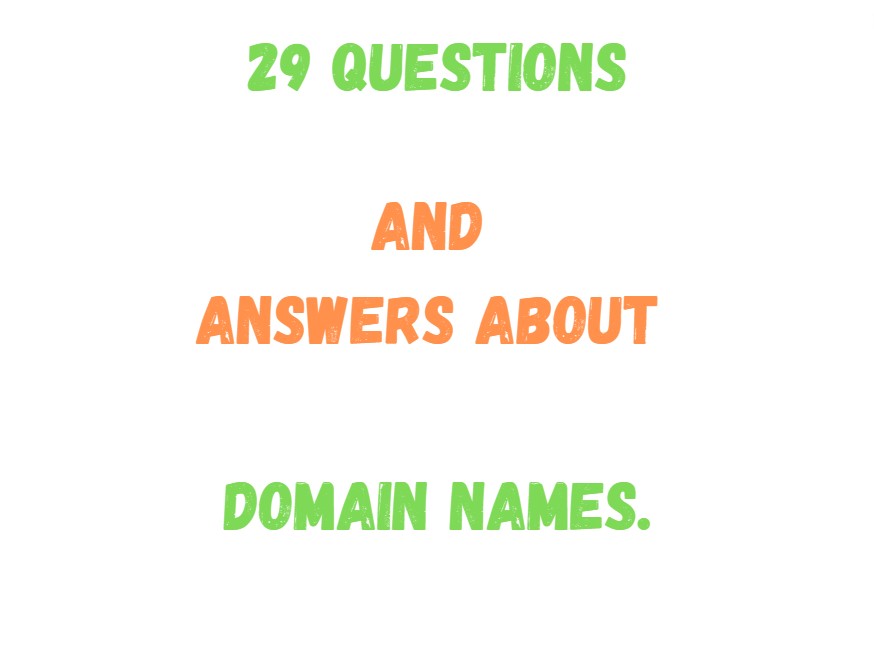
Domain names are an essential part of online communication and commerce, but they can often be confusing and difficult to understand.
FAQs about domain names can help address some of the most common questions people have about these important online tools.
This blog will go over the most asked questions about domains and answer them.
The Most asked questions and answers about domains
-What is a domain name?
In simple words:
a domain name is the way you find a website or information online.
More complex,
A domain name is a unique identifier for a website or online resource. At its most basic level, it consists of a series of letters and/or numbers that identifies the specific domain within a larger network. Domain names can also include additional components such as extensions, known as top-level domains, which typically identify what type of organization or entity owns the domain.
In essence:
Domain names are an essential part of online communication and commerce, as they allow users to easily navigate websites and access the information they need. They help establish credibility and authority for sites, making them a key tool for businesses, organizations, individuals, and others looking to build or expand their online presence.
-What are some examples of domain names?
Here are some domain name examples for you to best understand what a domain name is.
- Amazon.com
- Walmart.com
- Spotify.com
- Apple.com
- Android.com
- Dell.com
- Google.com
- Gmail.com
- Linkedin.com
- Facebook.com
-What are the common domain name extensions?
There are many different domain name extensions available, including .com, .net, and .org, among others.
These extensions can be used to identify a specific type of organization or business, such as,
- commercial website (.com),
- online service provider (.net),
- or non-profit organization (.org).
- (.ca) for Canada and
- (.uk) for the United Kingdom.
These are just a few of many, but the most popular.
-What is the best domain name extension I should get when I buy a domain name?
Domain name extensions are an important consideration when buying a domain name.
Of all the different options available, the .com extension is considered to be the best and most trusted choice.
Known for its reliability and recognized by businesses and individuals around the world, the .com extension is a top choice for anyone looking to get online quickly and easily.
On top of being the most recognized, this is what people will put after they type in your name because this is what they will expect you have.
So if you have this, you will likely be found online, if not you could have some trouble.
Related: Read Premium Domain Meaning to understand what a premium domain name is.
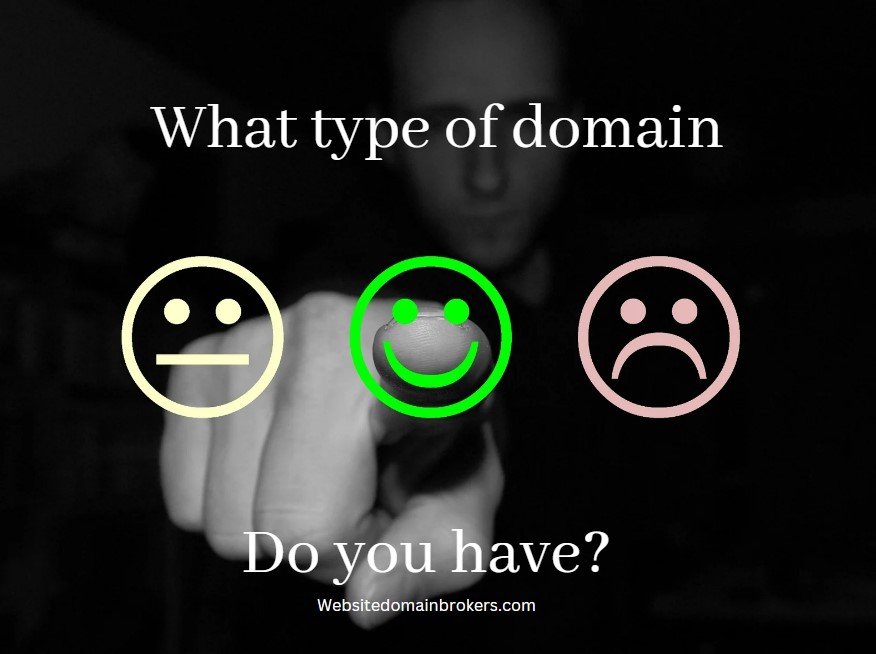
-What would be an example of a good domain name?
When it comes to domain names there is not a ” one size fits all” for a good domain.
There are many traits and characteristics that a good domain name will have. You will need to look at your domain name and evaluate it or ask an expert.
Here are some are things to look at to tell if you have a good domain name.
- How long is your domain name? Is it 1, 2, 3, or 4 words?
- Is your domain name spelt correctly?
- Would you need a dictionary to help you spell this name? Or is it easy to spell?
- Does this name mean something when people say it?
- Does the Domain clearly tell/ associate with what you do?
- Is the domain name a key phrase people are looking up?
- Is your domain a premium domain name?
- How old is your domain name?
- Was your domain name ever used for anything illegal?
-How do I know if I have a bad domain name?
If you are new to the world of domain names, you could have accidentally bought a bad domain name.
Here are some ways to see if you have a bad domain name.
- Is Your domain is a made up name?
- Is domain is ridiculously hard to spell?
- Is your domain name a made up name with numbers?
- Was your domain name used for anything illegal or for scamming people?
- Would you trust looking up the name or does it seem fishy?
-The “Grandma Test”
At the end of the day:
Can your grandma find your website without help? If so,
your domain name is probably decent.
Related: Read “6 Tips for Choosing a Domain Name”
Questions and answers about domains.
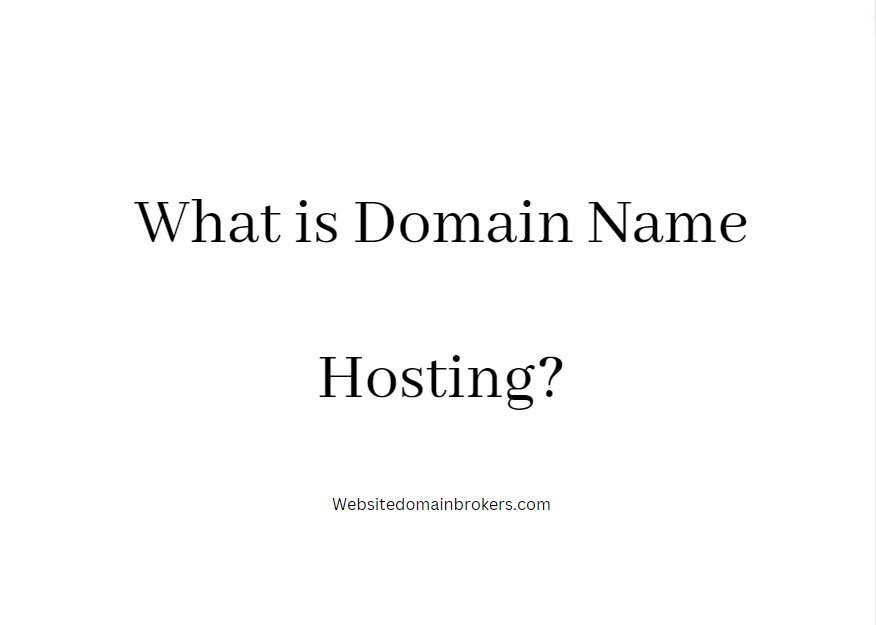
-What is domain name hosting?
Domain name hosting is a service that allows you to host your domain on the internet.
This can be done either through an individual or a company, depending on your needs and preferences. Domain hosting can provide a range of benefits including increased security, reliability, and performance for your website or online presence.
Here are the most popular domain hosting sites.
Simple terms:
Domain hosting is how your domain name shows on the internet and people can find it.
-How do I buy a domain name?
There are a few different ways that you can purchase a domain name
Register a domain.
If a domain is not owned by somebody you can register it through places like GoDaddy and own it immediately.
Buy it on market places or auctions.
You can buy it on market places and auctions like GoDaddy or Sedo.
Reach out to the owner.
If the domain name is owned by somebody you can reach out to the owner and see if they will sell.
Use a domain name broker.
When buying a domain name from somebody, you can hire a domain broker that will track the owner, negotiate, and help with the transaction.
These are the ways you can buy a domain name, read this blog to that goes into more detail on how to buy a domain.
Related: READ: 4 Ways on How to Buy a Domain Name. which goes on the in-depth ways to buy a domain name.
Can I buy a domain name that somebody owns?
Yes, it is possible to buy a domain name that somebody else owns. In most cases, you can reach out to the owner directly and request to purchase the domain from them.
However, there may be certain situations in which a domain broker can help you buy a domain that is already taken by someone else.
Related: Read Ways to Buy a Domain Name That is Taken.
-How do I sell a domain name?
There are a few different ways that you can sell a domain name, including:
Registering your domain name on a marketplace.
One popular option for selling a domain is to register it with a domain marketplaces like GoDaddy, Sedo ect.
Reaching out to companies that seem a good fit for you domain.
This means reaching out to a company that has a similar name or different extension and offering to sell.
Using a domain broker to sell.
A domain broker will be the best option to sell a premium domain name, as they will market your domain to the top decision makers and try to get you an offer.
Related: Read The Top 5 Ways How to Sell Your Domain Name.
-Can I sell a domain name myself?
Yes you can sell a domain name by yourself. You should consider using Escrow.com when transferring your domain name so you get your money and don’t get scammed.
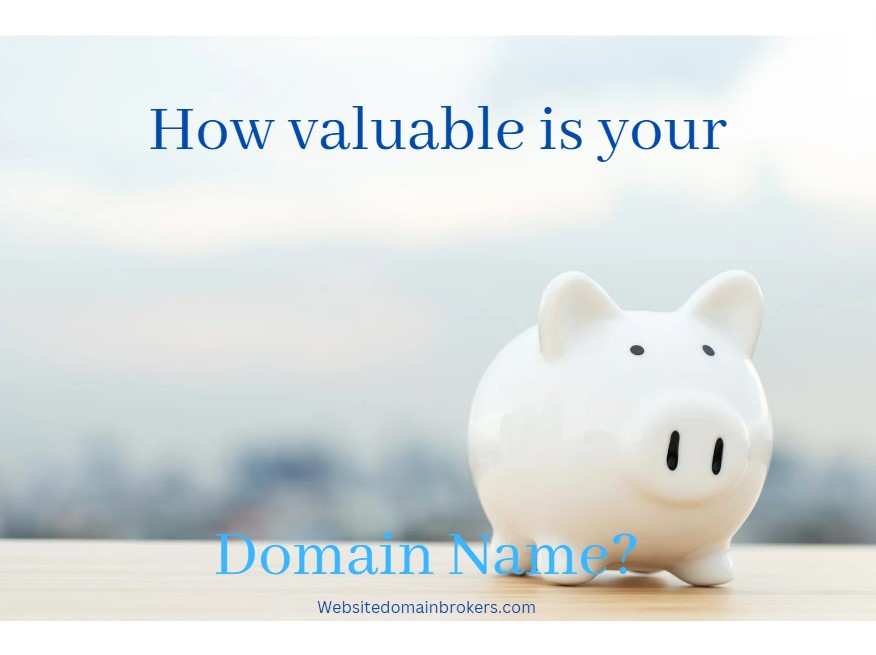
-How do I tell how valuable my domain name is?
There are a few different factors that can help you determine the value of your domain name.
Some key considerations include the length and clarity of the name, including any potential misspellings, as well as the traffic and level of engagement to your domain. You may also want to look at similar domains that have been sold in the past for an indication of how much your domain might be worth. Ultimately, the value of your domain will depend on factors such as the specific industry and niche in which you operate, as well as current trends in domain name ownership and usage.
Related: Read Top 9 Best Ways to Value What a Domain Name is Worth.
-What should I be paying for a domain name?
Depending on the domain name you want you could be paying anywhere from $12 to +$1,000,000 or more.
The type of domain name you want plays a huge roll in how much you will pay for it.
If it is a low level domain name that has no traction you will not have to pay much.
With a premium domain name especially high value names you could be paying 5 or 6-figures to get it.
Always evaluate what your domain name is worth before you buy or sell it.
There are several tools you can use or you can get a domain broker to help you.
-Can I own a domain name forever?
While it is possible to “own” a domain name, this does not mean that you own it forever. Instead, you own it for a specific period of time, usually one year at a time.
The renewal fee will be different for every domain name, you will need to check it with who you bought it from.
In essence you can “own” your domain name “forever” if you pay it every year.
-Is a domain name a monthly fee?
There are only yearly fees for a domain name.
You can pay the renewal fee up to 10 years in advance.
-What is a domain name manager?
A domain name manager is a tool that allows you to easily manage your domain names from one central location. This can include tasks like adding or removing domains, setting up DNS records, and making changes to domain settings.
Some popular domain name managers include GoDaddy, Bluehost, Dreamhost, and HostGator. These tools are typically integrated into your web hosting provider’s control panel, which makes them easy to access and use.
If you’re looking to manage your domain names more effectively, a domain name manager can be a great tool to help you get the job done.
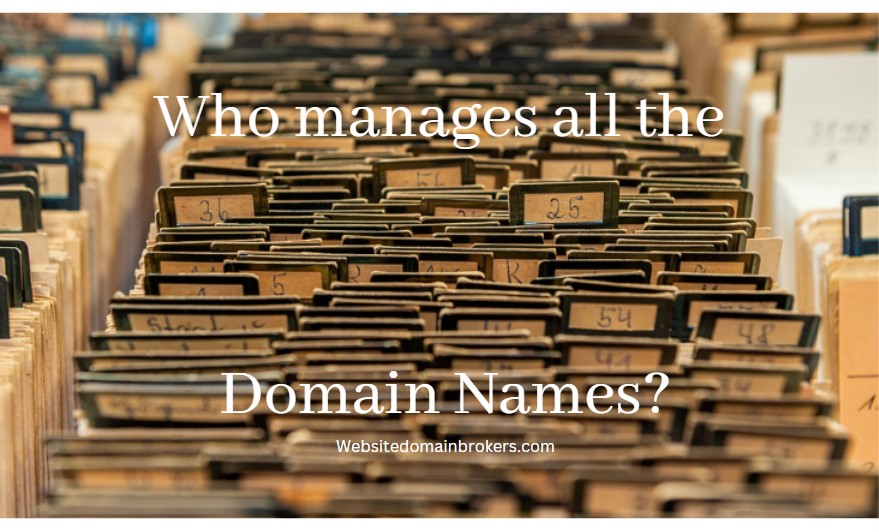
-Who manages all the domain names?
The Internet Corporation for Assigned Names and Numbers (ICANN) is the organization responsible for managing domain names across the globe. ICANN sets policies and standards for how domain names are assigned, and maintains a central registry of all available domains.
In addition to ICANN, there are also many other organizations that manage specific top-level domain names, such as .com and .org. These organizations are responsible for setting policies and registering domain names under these top-level domains.
Overall, ICANN is the primary organization that manages all of the different domain name registrars and top-level domains on the internet. As such, they play a critical role in how we navigate and interact with the web on a daily basis.
-How do you choose a domain name?
There are several things to consider when choosing a domain name, including:
– The length and structure of the domain name.
If your domain name is too long or too difficult to spell, it can decrease the chances that people will remember and find it.
– The relevance of the domain name to your business or website.
Ideally, your domain name should match what you do and should be easy for people to understand.
– Whether the domain name is easily available.
Many businesses and websites prefer to use the .com extension, so it may be difficult to find a domain name that is both available and relevant.
– Whether the domain name can be easily adapted and personalized.
Your domain name should be easy to remember and memorable, so you may want to use a common word or phrase.
If you’re looking for help in choosing a domain name, there are many tools and resources available online.
Make sure you domain name has all the characteristics of a good domain name when you buy.
Related: Read The Startup’s Guide How to Buy a Domain Name.
-Can I get a free domain name?
Yes, there are several platforms and services that offer free domain names for a limited time. Some of these include,
- Freenom,
- Cloudflare
- 000webhost
To get a free domain name, you can simply sign up with one of these platforms or services and follow the instructions to register your domain name.
Read “Discover where to get free domain names” where we go in-depth on how to get free domains.
Related: Read Discover where to get free domain names.
-How easy is it to get a domain name?
Getting a domain name is relatively easy and can often be done in just a few minutes.
There are several factors that will influence the ease of getting a domain name, including:
– The availability of your desired domain name.
Many domains are already taken, so it may take some time to find one that is both available and relevant to your business or website.
– The cost of the domain name.
Domain names can vary greatly in price depending on their extension and type.
– Requirements for registering a domain name, such as providing contact information or proof of identity.
Some platforms may also have additional requirements for getting a domain name, such as providing a credit card or PayPal account.
Overall, getting a domain name typically involves just a few simple steps and can often be done in just a few minutes.
If you’re looking for help in choosing or registering a domain name, there are many tools and resources available online to get you started.

-Is buying an expired domain names good?
There are a number of benefits to buying expired domain names, including gaining access to backlinks and other valuable SEO metrics. However, it is important to carefully evaluate the quality and history of an expired domain before you purchase it. In particular, you should make sure that the domain was not used for any illegal or unethical activities prior to buying.
Related: Read How does buying expired domain names help SEO?
-Can you make money buying and selling domain names?
Yes, buying and selling domain names can be a profitable business opportunity.
There are several factors that can influence the profitability of buying and selling domain names, including:
- The quality and value of the domain name.
- Premium domains with desirable keywords or extensions can fetch a higher price than others.
- Competition in the domain name market.
- There may be more buyers or sellers in the domain name market, which can impact buying and selling prices for specific types of domains.
- Certain types of domains, such as brand or geographic names, may have higher demand than others and therefore command a higher price.
- If your domain name has all the qualities of a good domain (as stated above) there is a good chance you can sell and be profitable.
- If there is a company that owns a domain similar to yours (but with a different extension) there is a chance they will buy your name for security reasons.
- Consider listing your domain names on auction sites and see if anyone is interested.
- For high level domains (premium domains) consider using a domain broker to sell it.
Related: Read Domain Name Investing to understand how you could make money.
-What is an abusive domain?
An abusive domain is a website or online resource that is used for illegal or harmful purposes, such as phishing, malware distribution, spamming, or botnet activities.
These domains may be registered and used by individuals, organizations, or third-party services in order to carry out illicit activities online.
They can pose significant risks to users and online systems by spreading viruses, stealing sensitive information, or infiltrating networks.
It is important to be aware of potential domains of abuse and take steps to protect yourself and your online systems from harmful activities.
Related: Read How to spot a “domain broker scammer”.
-Can I trace the owner of a domain name?
There are several methods you can use to trace the owner of a domain name, including WHOIS searches and domain tracing tools.
One of the most common ways to find the owner of a domain is by performing a WHOIS search on the domain in question. With this method, you can typically find information about the registrant, email address and possible more.
-Can I erase the WHOIS record on my domain name?
It is possible to make the WHOIS data to your domain name private. You will need to view the instructions of your hosting provider to see the details.
-Can someone hack my domain name?
Yes, it is possible for someone to hack your domain name. This can occur due to a variety of factors, including poor security practices and vulnerabilities in website software or hosting platforms.
- Some common methods used by hackers to hack domain names include:
- Exploiting known vulnerabilities in website software (such as WordPress) or default settings in servers or hosting platforms
- Brute force attacks, which involve using automated tools to guess usernames and passwords for your domain name
- Social engineering techniques, such as phishing scams or other forms of online deception
- Using malware like keyloggers to steal login credentials that are used with your domain name.
- The ways you can get your domain hacked are endless, always use a security plugin on your domain.
- Note if your domain is parked, you can not get hacked via brute force or similar hacking strategies, since it is not online.
Related: Read 7 Tips for Preventing Domain Name Hijacking in 2022.
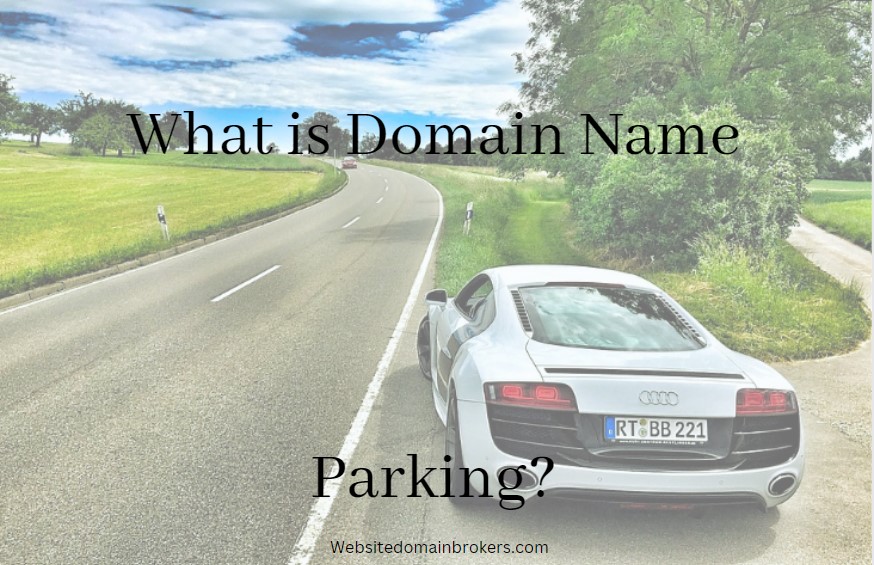
-What is domain parking?
Domain parking is the process of registering a domain name for future use, but not using it to host any online services or content. This allows you to purchase and reserve a domain without immediately setting up your website or email hosting, giving you the flexibility to activate it at a later date.
There are several benefits of domain parking, including:
- Saving money on registering and renewing domain names.
- Avoiding potential conflicts with other companies that may have similar domain names.
- Securing your brand or business name for future use.
- Protecting yourself from malicious actors who may try to register your preferred domain name first.
-How do you buy a domain name anonymously?
There are a few different methods you can use to buy a domain name anonymously. One popular approach is to use a domain broker, which allows you to anonymously register or transfer your domains without having to disclose any personal information. By far this is the best way to anonymously buy a domain name.
Related: Read Discover the secrets to Buy a Domain Name Anonymously.
